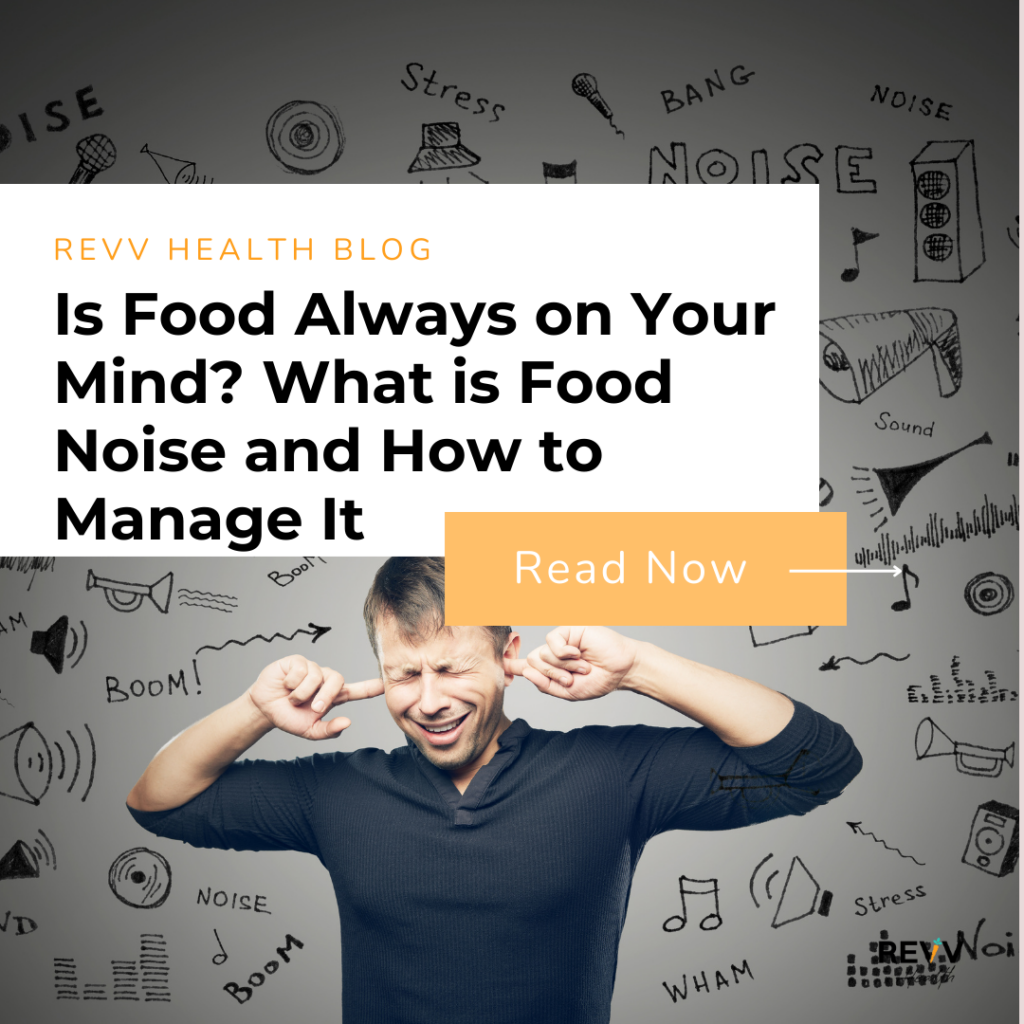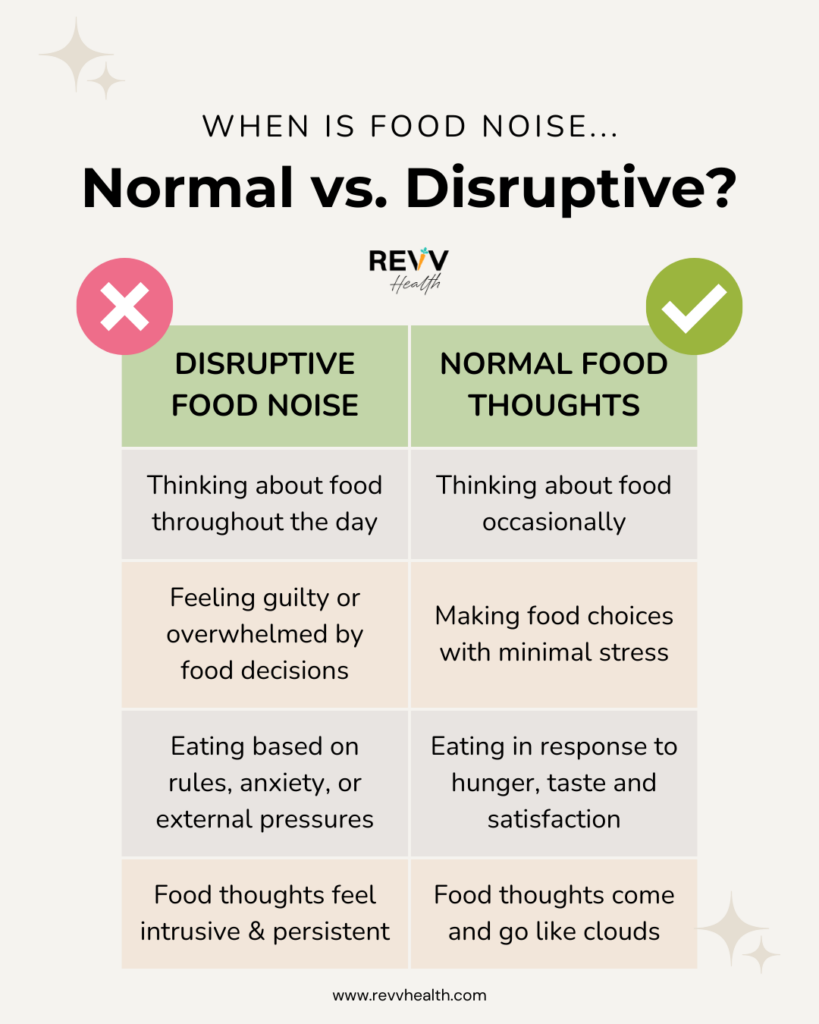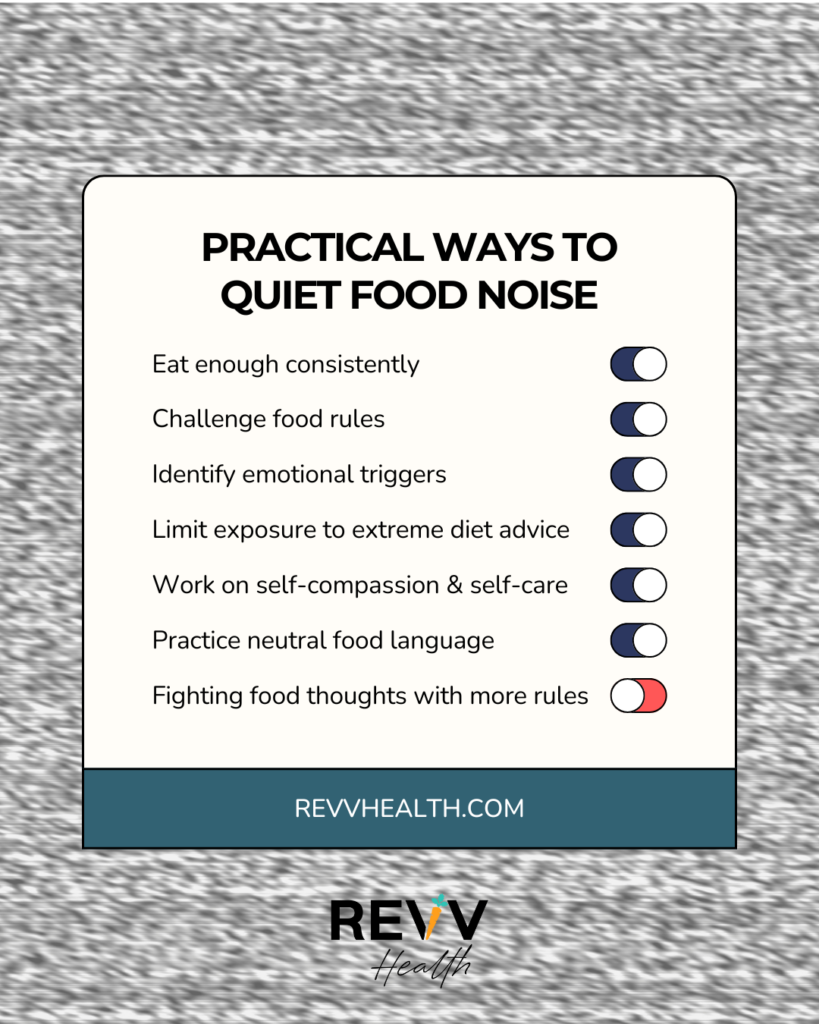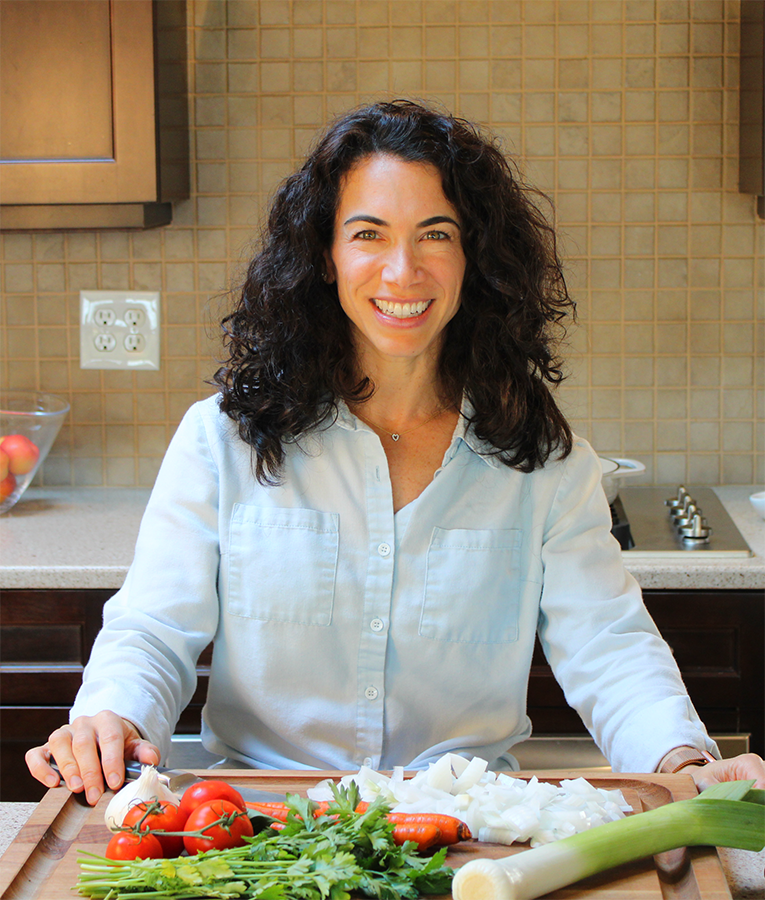Listen to this article:
Do thoughts about food take up more brain space than you’d like?
Maybe you just ate, but you’re already thinking about your next meal. Or you’re caught in an endless loop of…
What should I eat?
Is this food okay to eat?
Am I doing this right?
Having those kinds of whirly-swirly thoughts on a loop is exhausting. So, if this kind of mental chatter is familiar, I know how loud it can get.
There’s a name for it: food noise.
Welcome; I’m Marissa, a non-diet dietitian. This means that I help chronic dieters, those with eating disorders, and anyone feeling stuck in restrictive food rules break free from the mental tug-of-war with eating.
This blog will help you understand what food noise is, why it happens, and how to tell if it’s just a normal part of eating or something more disruptive. Because while food noise can feel frustrating, not all of it is bad. Thinking about food is part of being human!
Let’s take a closer look at what’s going on.
What is food noise?
Food noise refers to persistent, intrusive thoughts about food that can take up mental space throughout the day. Some people describe it as a constant hum of cravings, stress, or indecision about what (in the heck!) to eat (source).
Food noise can show up in different ways, including:
- Thinking about food… even when you’re not hungry (or wondering if you should be hungry).
- Feeling overwhelmed by food choices, i.e., what’s “healthy,” what’s “allowed,” or what’s “right.”
- Mentally debating food decisions long after you’ve eaten.
- Craving certain foods intensely but feeling like you “shouldn’t” eat them.
Recently, I asked my clients and newsletter subscribers about their experience with food noise. Here’s what they shared:
“It feels like a never-ending mental loop. I constantly second-guess my hunger and food choices.”
“Some days, food thoughts are running in the background of my mind all the time, and I have a hard time focusing on other aspects of my life.”
“It’s every day. I always have thoughts about food. Do people actually have days where they don’t think about it? That’s foreign to me. I don’t think I’ve had a single day in my life where I haven’t thought about how I look, what I’m eating, if it’s good or bad…”
If this resonates with you, you’re not imagining it. Food noise is real, and very common. But I’ll also mention that the big idea here isn’t to quiet ALL of the internal monologues about food but rather to not have so MANY thoughts about food that they’re negatively impacting your quality of life.
Is some food noise normal?
The short answer? Yes.
It’s completely normal to think about food throughout the day. In fact, food thoughts serve an important purpose:
- It helps you plan meals. (What’s for dinner? What should we put on our grocery list?)
- It guides cravings. (I really want a fresh salad today, or I could go for a burger.)
- It reminds you to eat when you’re getting hungry.
This kind of food noise is not a problem. It’s your body’s natural way of planning how to eat and nourish your body.
However, problematic food noise happens when:
- It’s causing stress, guilt, or shame.
- It’s interfering with your ability to focus, work, or be present in daily life.
- It’s making food choices feel exhausting or anxiety-inducing.
- It’s tied to external food rules rather than your body’s true needs.
You might be thinking, if food noise is part of everyday life, why does it sometimes become overwhelming? What makes it feel so loud and all-consuming?
Why does food noise feel so loud?
Food noise doesn’t just appear out of nowhere.
It’s often shaped by past experiences, habits, and even biology.
Here are some of the biggest factors that can make food thoughts feel persistent or overwhelming:
- Dieting and restriction: when your body isn’t getting enough energy, your brain prioritizes food, making it hard to think about anything else.
- Conflicting nutrition messages: the endless stream of advice about what’s “right” or “wrong” to eat can create decision fatigue and self-doubt.
- Emotional triggers: stress, boredom, and emotions can make food noise louder, even when hunger isn’t the driving factor.
- Your brain’s natural wiring: food-seeking is a survival mechanism, and in today’s food-abundant world, your brain might be paying more attention than you realize.
But just because food noise may feel problematic to you doesn’t mean you’re stuck with it. If it’s feeling intrusive, below are four ways to turn down the volume and make eating feel easier.
4 ways to start managing food noise (if it’s disrupting your life)
If food noise is making eating feel stressful or overwhelming, here are a few ways to start turning down the volume:
1. Eat enough, consistently
If you’re under-eating, the food noise will get louder. Eating balanced meals with carbs, protein, fat, and fiber at regular intervals (every 3-4 hours) helps stabilize hunger signals and reduce obsessive thoughts about food.
Eating balanced meals can even help you learn how to make satisfying choices when you’re hungry, but nothing sounds good.
2. Challenge food rules
The more we restrict foods, the more we crave them. Giving yourself permission to eat a variety of foods (without guilt) can actually help decrease food noise over time.
3. Identify emotional triggers
Ask yourself: am I actually hungry, or is this something else? If food noise is tied to stress or boredom, addressing the underlying emotion can help reduce its intensity.
(Note – I am not advocating for you to trick yourself into ignoring hunger. Most of us are already really good at tuning out our hunger cues, often because of years of dieting or food rules. Instead, I’m inviting you to get curious about what your body actually needs. That might include balanced meals and treats, but it also might include things like connection, joy, rest, or simply feeling satisfied. The idea is to listen better, not less.)
4. Cut through the “wellness noise”
If food choices feel overwhelming, getting professional guidance from a non-diet dietitian (rather than relying on fake news and social media) can help you develop a way of eating that feels good and works for you.
A Food Noise Case Study
Recently, a client of mine – let’s call her Kelly – told me that food noise had been a constant presence in her life, so much so that the idea of a day without thinking about food or her body felt “completely foreign” to her.
I’ve quoted her above and will reiterate what she said:
“I don’t think I’ve had a single day in my life where I haven’t thought about how I look, what I’m eating, if it’s good or bad…”
When we started working together, she wasn’t sure food noise could ever get quieter. But instead of just focusing on food itself, we dug deeper into the thoughts and emotions driving the noise.
We worked on:
- Recognizing that feelings don’t have to dictate actions, for example, noticing the urge to eat to numb feelings and choosing a different response.
- Separating self-worth from body image by challenging deeply ingrained beliefs about appearance and success.
- Gaining confidence in food choices by eating consistently, with a larger variety, and giving herself permission to enjoy meals without guilt.
- Building a life outside of food thoughts. She started re-engaging in hobbies and social activities, even when body image discomfort was present.
At first, these shifts felt uncomfortable. But over time, she noticed moments where food wasn’t the loudest thing in her mind anymore.
She shared that for the first time in years,
“I could order what sounded right for my body at a restaurant without guilt and even had moments where I wasn’t thinking about food at all.”
If food noise has been running your life, know that this is quite common, and you don’t have to live like this forever. Small, intentional changes (especially those that go beyond food itself) can make a huge difference.
What about GLP-1 medications?
We can’t end this article without a mention of the sudden popularity of GLP-1 medications (like Wegovy, Ozempic, and Zepbound) and their promise of quieting food noise.
Yes, many people report that these drugs help “turn down the volume” on food noise by reducing appetite and altering hunger signals.
This can be a relief for those who have struggled with persistent thoughts driven by physical hunger and cravings.
However, food noise isn’t only hunger-related. It can also be reinforced by:
- Habits and learned behaviors (such as binge eating or years of restrictive dieting)
- Food rules and fear of “bad” foods
- Anxiety or guilt around eating
- Social and environmental triggers
GLP-1 medications may reduce biological food noise (the drive to eat due to hunger), but they don’t teach you how to navigate food choices, challenge restrictive food rules, or develop a more peaceful relationship with eating.
That’s why, whether or not medication is part of your approach, learning how to trust your body’s cues and building sustainable eating habits still matter.
(I’ll be diving deeper into GLP-1s and their impact on food noise in a future blog, so stay tuned! Once that post is published, I’ll link it here).
Final thoughts
Food noise is a common human experience. It’s completely normal to think about food throughout the day. But when those thoughts become intrusive, overwhelming, or stressful, they can interfere with daily life.
In this post, you learned:
- What food noise is and why it happens
- When food noise is normal vs. when it might be disruptive
- The biggest contributors to food noise, including dieting, conflicting nutrition messages, emotional triggers, and biology
- Practical ways to quiet food noise, like eating enough, challenging food rules, and identifying emotional triggers
Food noise isn’t something you need to eliminate completely; some of it serves a purpose. But if it’s making eating feel all-consuming, there are steps you can take to turn down the volume and build a more peaceful relationship with food.
First steps to address food noise
If you’re wondering whether your food noise is something to be concerned about, start by reflecting on these questions:
- Is my food noise just normal hunger, or is it interfering with my life?
- Am I skipping meals either accidentally or intentionally?
- Do I have rigid food rules that make eating more stressful than it needs to be?
If these questions hit home, I can help.
I offer free connection calls to help you sort through all of this and more with a real human on the other end. During these calls, there is no pressure to start working together, as I simply want to help you gain clarity about your situation and figure out your next BEST steps.
BTW: Most of my clients end up paying $0 out of pocket with insurance. I am in-network with Blue Cross Blue Shield, Premera, Regence & Aetna. Check my fees page to read more about how to get started, or feel free to reach out if you have questions.





0 Comments